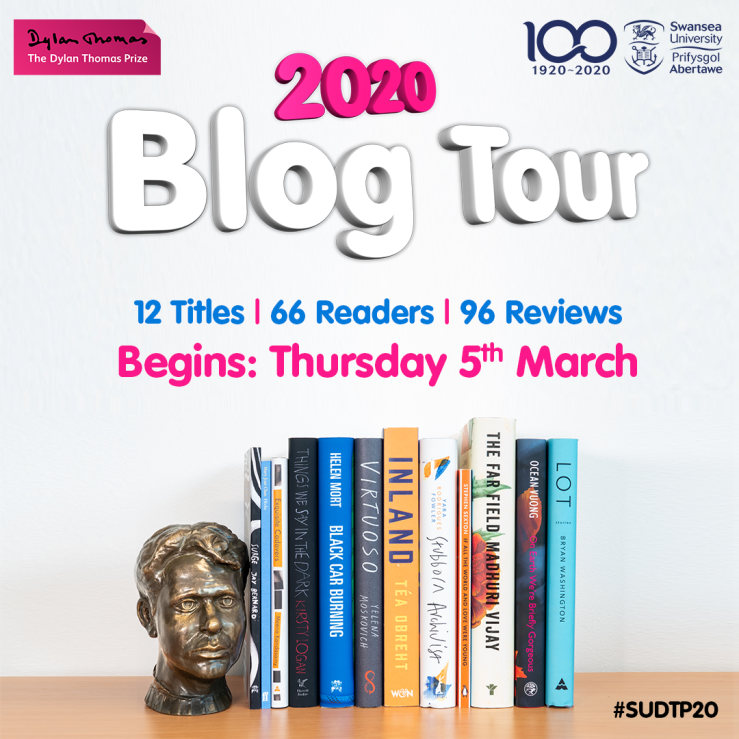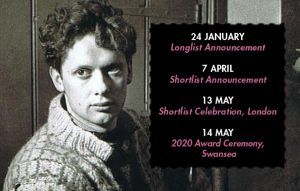
Welcome to today’s stop on the mega blog tour celebrating the authors on the longlist for the Dylan Thomas Prize 2020. I’m delighted to bring you my review of one of the longlisted books – On Earth We’re Briefly Gorgeous by Ocean Vuong. My thanks to Martina at Midas PR for inviting me to take part in the tour and for organising my review copy.
Look out for my review of another of the books on the longlist – The Far Field by Madhuri Vijay – on 2nd April and for the announcement of the books that have made the shortlist on 7th April. To ensure you don’t miss a thing, follow the hashtag #SUDTP20 on Twitter.
 About the Dylan Thomas Prize
About the Dylan Thomas Prize
Launched in 2006, the annual Swansea University International Dylan Thomas Prize is one of the most prestigious awards for young writers, aimed at encouraging raw creative talent worldwide. It celebrates and nurtures international literary excellence. The £30,000 Prize is awarded to the best published literary work in the English language, written by an author aged 39 or under.
 About the Book
About the Book
On Earth We’re Briefly Gorgeous is a letter from a son to a mother who cannot read. Written when the speaker, Little Dog, is in his late twenties, the letter unearths a family’s history that began before he was born – a history whose epicentre is rooted in Vietnam – and serves as a doorway into parts of his life his mother has never known, all of it leading to an unforgettable revelation.
At once a witness to the fraught yet undeniable love between a single mother and her son, it is also a brutally honest exploration of race, class, and masculinity. Asking questions central to our American moment, immersed as we are in addiction, violence, and trauma, but undergirded by compassion and tenderness, On Earth We’re Briefly Gorgeous is as much about the power of telling one’s own story as it is about the obliterating silence of not being heard.
With stunning urgency and grace, Ocean Vuong writes of people caught between disparate worlds, and asks how we heal and rescue one another without forsaking who we are. The question of how to survive, and how to make of it a kind of joy, powers the most important debut novel of many years.
Format: Hardcover (256 pages) Publisher: Jonathan Cape
Publication date: 4th June 2019 Genre: Literary fiction
Find On Earth We’re Briefly Gorgeous on Goodreads
Purchase links*
Amazon.co.uk | Amazon.com | Hive (supporting UK bookshops)
*links provided for convenience, not as part of any affiliate programme
My Review
‘They say nothing lasts forever and I’m writing to you in the voice of an endangered species.’
As a letter written to someone who may never read it (his illiterate mother, Rose) the whole book has a confessional quality. It’s just as much an un-burdening as an attempt at communication. Indeed, at one point, Little Dog writes, ‘the very impossibility of your reading this is all that makes my telling it possible’.
Amongst Little Dog’s memories of his childhood are happy ones such as trips to the shopping mall with his mother but also her acts of occasional cruelty towards him. Both his mother and grandmother, Lan, bear the psychological scars of their experiences during the Vietnam War. In the case of his mother, this is manifested in a desire to make her son more American. Often her attempts to achieve this are quite bizarre such as her insistence that he consume large quantities of milk to build him up physically, ‘both of us hoping the whiteness vanishing into me would make more of a yellow boy’. Unfortunately, Little Dog still experiences bullying by his schoolmates because of his ethnicity and less than perfect knowledge of English.
In fact, Little Dog finds himself caught between two worlds as far as language is concerned. His English may be rudimentary to begin with but it is better than his mother’s, which is almost non-existent, and he appoints himself the family’s interpreter. At the same time, his knowledge of Vietnamese is limited by his mother’s poor education, interrupted by war. ‘Our mother tongue, then is no mother at all – but an orphan.’ He learns, however, that in Vietnam not everything that needs to be communicated has to be spoken. Non-verbal gestures can convey just as much. ‘Care and love, for us, are pronounced clearest through service.’ The reader sees this played out through Little Dog’s tending of his grandmother.
Readers should be aware the book contains graphic descriptions of a sexual nature and one scene involving animal cruelty. However, there are also poignant moments of tenderness such as Little Dog gathering flowers for his grandmother and his mother giving a pedicure to an old lady.
As the author is a poet, it’s no surprise the book contains some striking imagery. Travelling by Greyhound bus through the night, Little Dog observes the outside ‘surge by like sideways gravity’. Lying on the ground alongside a friend, he compares the stars in the night sky to ‘a vast smudge on a hastily-wiped chalkboard’.
A sort of literary kaleidoscope, the book embraces a number of different styles. One chapter near the end resembles poetry with paragraphs containing seemingly random thoughts. At the same time, there are sections in which Little Dog talks about events as if he was a witness to them rather than a participant, referring to himself as ‘the boy’. There are sections which impart information on subjects as diverse as the migration habits of butterflies, the golfer Tiger Woods and the scourge of painkiller addiction in the US.
As an aspiring writer, Little Dog spends quite a bit of time considering the nature of writing and language. (One suspects much of this reflects the author’s own point of view.) For example, pondering what it means to be a writer he protests, ‘I never wanted to build a “body” of work, but to preserve these, our bodies, breathing and unaccounted for, inside the work’. For Little Dog, even punctuation has meaning beyond merely its grammatical purpose. Learning of the death of a friend, he observes ‘the saddest thing in the world…a comma forced to be a period’ (or as we would say in the UK, a full stop).
Storytelling is another theme and the way in which tales are passed from one person to another, often changed in the retelling. The nail salon where his mother works, for example, is ‘a place where folklore, rumours, tall tales, and jokes from the old country are told, expanded…’.
As well as the story of a family, On Earth We’re Briefly Gorgeous is an exploration of identity, race, sexuality and the legacy of war. It contains some complex ideas (including references to the work of Roland Barthes which gave me flashbacks to my MA English study and my struggle to grasp the concept of intertextuality) meaning it is by no means an easy read. However, it’s a book of startling literary imagination and originality.
In three words: Reflective, complex, thought-provoking
Try something similar: The Long Take by Robin Robertson
 About the Author
About the Author
Ocean Vuong is the author of the critically acclaimed poetry collection Night Sky with Exit Wounds, winner of the Whiting Award and the T.S. Eliot Prize. His writings have also been featured in The Atlantic, Harper’s, The Nation, New Republic, The New Yorker, and The New York Times. In 2019 he was awarded a MacArthur Foundation Fellowship.
Born in Saigon, Vietnam, he currently lives in Northampton, Massachusetts, where he serves as an Assistant Professor of English at UMass-Amherst. On Earth We’re Briefly Gorgeous is his first novel. (Photo credit: Tom Hines/Dylan Thomas Prize website)


Excellent review, Cathy. I was attracted to this beacause of Vuong’s reputation as a poet but perhaps I’ll leave it until we’ve returned to some semblance of normality.
LikeLiked by 1 person
Thank you. Normality seems a long way away at the moment, doesn’t it?
LikeLike
It does, indeed. I’ve worked from home for many years which has prepared me well but I’m missing seeing friends.
LikeLike
I’m missing going to the cinema and browsing in a bookshop!
LikeLike
Me, too. Our day out in Salisbury feels impossibly exotic now!
LikeLike